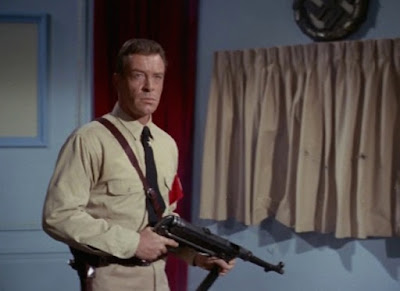For those who are new to my episode reviews, you can find the post where I establish my point criteria here
Overview – The Enterprise travels to the planet Ekos to find John
Gill, a Federation cultural observer who has gone missing. On Ekos, they
discover the planet in conflict with its neighbor, Zeon, and Ekos has developed
a regime almost identical to Nazi Germany. Kirk is shocked to learn that the
Fuhrer of this regime is the missing Gill. While investigating on the planet,
Kirk and Spock are captured by the SS. As they plot their escape, they must
find a way to reach Gill and undo the cultural damage he has done.
Score: 8/10 – An interesting example as to why the
Prime Directive must be adhered to, “Patterns of Force” gives us a chance to
see how Kirk and crew would fare in Nazi Germany. I found this episode to be
somewhat compelling and relevant to today’s climate. It is not unusual for science
fiction to take lessons from Earth’s past and put a sci-fi twist on it to teach
us something, and this episode is a prime example. We an ingenious jailbreak on
the part of Spock, something we will see again. We are given excellent
performances by all the actors involved, with special commendation given to
Skip Homeier who plays a malicious Melakon. A solid episode that highlights the
best that Trek can offer.
Relevance – 1 point. As I mentioned earlier, in this
episode we get a glimpse into Spock’s ability to find ingenious ways to break
out of jail cells. This is mentioned in “Star Trek V: The Final Frontier”.
Continuity – 2 points. Character continuity works. We
see disappointment in Kirk as he learns what his former Academy instructor had
done. We see resiliency in both Kirk and Spock as they are tortured by the
Nazis. Universe continuity is also intact here. Of particular note, I
appreciate how after Spock’s lashings he is shown to have green blood streaks
across his chest. Story continuity bears a closer examination, however. We were
told in “Bread and Circuses” about Hodgkin’s Law of Parallel Planetary
Development, implying that it is possible for familiar historical events to develop
independently between two worlds. In this episode, such a theory is either
discarded or disregarded. That could be a bit confusing for the viewer that
pays attention to such details, so we will have to deduct a point here.
Character Development – 3 points. Kirk and Spock are given the
most character treatment, which is normal. Kirk has to deal with the mistakes
made by an academy professor that he greatly respected and admired, a sort of
“fallen hero” idea. It causes Kirk some concern. Spock shows off his
intelligence and ingenuity by using the crystals in their transponders to make
a laser that melts the lock of their cell door, establishing him as a master
escape artist. Both of these developments and experiences do provide some
significant development to these two characters, so full points are scored in
this category.
Social Commentary – 3 points. The familiar “if you do not
learn from history you are doomed to repeat it” warning and why the Prime
Directive is the most important law in the Federation are fully on display
here. Some people argue that because the Nazi regime was quite efficient (a
point that has been disputed and to some discredited since) that it would be
worthwhile to adopt some of its practices while hoping to avoid the more
unsavory aspects of it. That is a slippery slope that is wisest to avoid rather
than attempt to traverse. As with so many historical examples, this story shows
that power corrupts the individual and the society. Nazism is not something to
be admired, even and especially through the lens of history. Today we see
examples of how people turn to extreme ideologies when pushed, either through
fear or hardships. It is as important today as it was fifty years ago to be
committed to resisting such rhetoric that not all equal.
Cool Stuff – 1 point. Spock’s use of the transponder
crystals to make a laser is quite fun. Yes, some may describe it as a
convenient plot device to help them escape, but it still made for a cool scene,
so a point is scored.
Rank – Captain (18 points). A well-written episode that tells a
compelling story and gives us a timeless message. It also cements the
importance of the Prime Directive by showing us the worst-case scenario that
results from its violation. This is one of the reasons why Star Trek was such a
ground breaking series for its time in that it did not hesitate to tackle
serious issues head on.
If you would like to read other reviews from the Original Series, click on the link here.
If you would like to read an episode review from any of the Trek series, click the following link to get to the series catalog. If the episode you want reviewed has not been done yet, then feel free to request it in the comments and I will see what I can do.
If you would like to read an episode review from any of the Trek series, click the following link to get to the series catalog. If the episode you want reviewed has not been done yet, then feel free to request it in the comments and I will see what I can do.










No comments:
Post a Comment